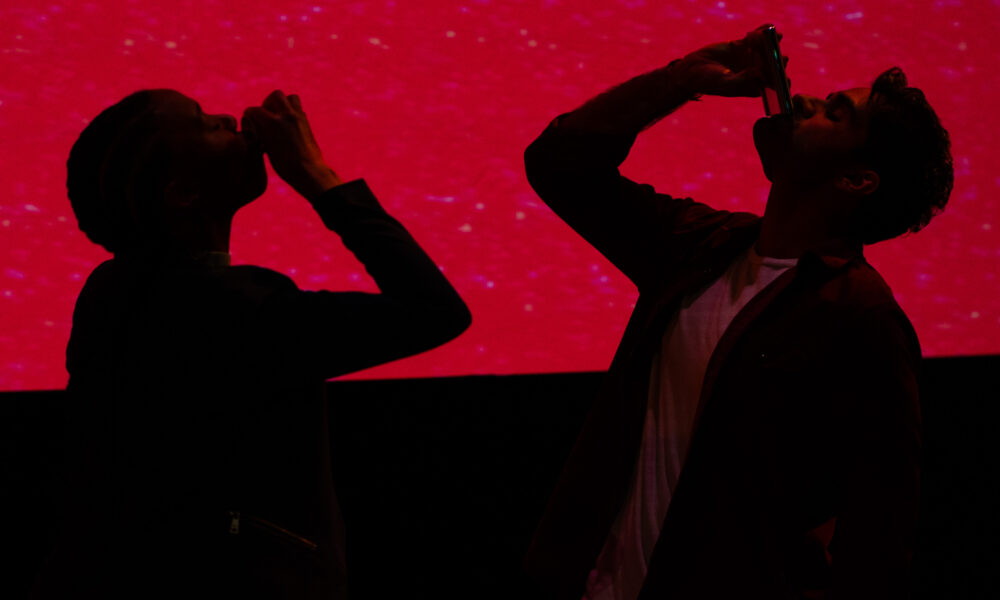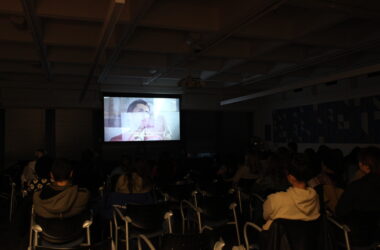Universities often reflect our broader society in terms of both shared values and differences, creating a privileged microcosm of the world. By setting her newest play, What Rough Beast, on a college campus, playwright Alice Abracen condenses complex political dynamics into a conversation between seven characters. Her script examines the contrast between encouraging open discourse versus censorship when addressing dangerous extremist rhetoric.
The play, which debuted at Centaur Theatre on March 2, follows the conflict between university students after a controversial right-wing speaker is invited to speak at their campus. Audiences watch as characters both dehumanize each other and attempt to “reach across the gap.” Abracen initially began writing the play in college, intending for the script to be written “by and for students,” with no adult characters ever actually appearing on stage.
In a unique chance for young people to access theatre, Centaur Theatre hosted a mid-afternoon matinee in addition to evening performances, allowing groups of high school students to experience the power of live performance. The students sat on the edge of their seats, deeply engrossed as they whispered to their friends, gasping and laughing at outrageous lines. In a talk-back panel after the show, the director noted a personal interaction she had with a 13-year-old student after the show, claiming he related strongly to the white, privileged characters and expressed frustration over the play, annoyed that there was “no right answer” or character.
What Rough Beast provokes difficult conversations, delving into the challenges of creating dialogue and empathy within a small, polarized community. Despite the weighty subject matter, the plot is surprisingly dynamic and colourful. According to Abracen, the script’s tone is “a marriage of humour and humanity with political horror,” and this is evident in its bold and raunchy style that manages to make up for any awkward dialogue.
Charlotte Dennis delivers a particularly poignant and heart-breaking performance as Alyssa, capturing the anguish of a sister watching her brother’s rapid descent into right-wing extremism and critical mental health issues. Her portrayal of Alyssa’s struggles is both nuanced and raw, conveying the complexity of emotions—guilt, helplessness, and fear—that comes with watching a loved one slip away. Dennis’s performance highlights the devastating impact of radicalization and mental illness on families and communities, leaving a strong, lasting impression on audiences.
The immersive experience of live theatre allows audiences to connect in a more authentic way, especially in an era where screens mediate much of our communication and dialogue across differences. By investing in younger audiences and creating spaces for them, Centaur Theatre is helping to cultivate a new generation of theatre-goers who are eager to engage in meaningful conversation.
The plot and conflict of the play exhibit haunting parallels with the demonstrations that took place on McGill’s campus against the “Sex vs. Gender (Identity)” debate and anti-trans speakers in early January. Much like the right-wing professor invited to speak in the play, the debate in Chancellor Day Hall sparked discourse about the difference between encouraging open dialogue and platforming hatred and intolerance. Abracen’s script is perfectly geared toward McGill students, providing an enlightening and sobering social commentary on the current state of political tensions and vulnerabilities on campus.
“It was very important to me that the students are central characters,” Abracen said in an interview with The McGill Tribune. “Each of [them], in some way, feels that they are carrying the weight of the world on their shoulders. They are making decisions that are going to have major ramifications. The stakes are no less high because they are students.”
What Rough Beast asks the question many college campuses are currently grappling with: Does fostering genuine discussion have to mean legitimizing bigoted views, and if so, how can we achieve consensus and unity? This thought-provoking and nuanced conversation is sure to have a lasting impact on audiences, sparking discussions about politics and ideological differences long after they leave the theatre.
What Rough Beast ran at Centaur Theatre from March 2 to 11.









